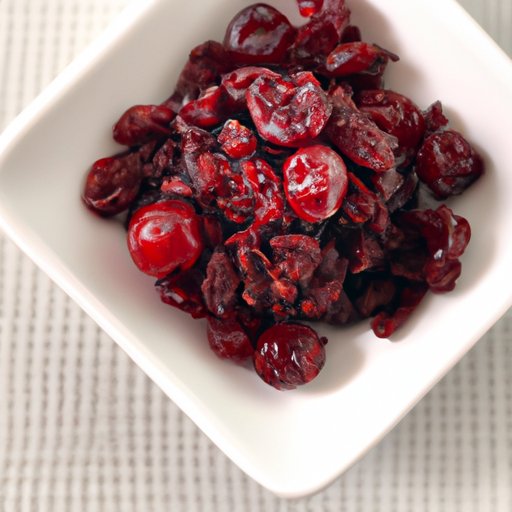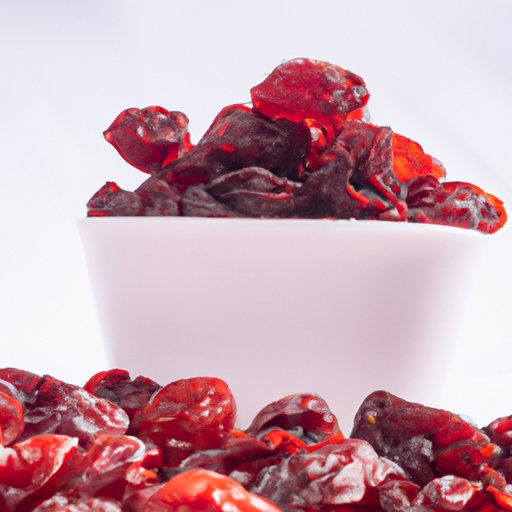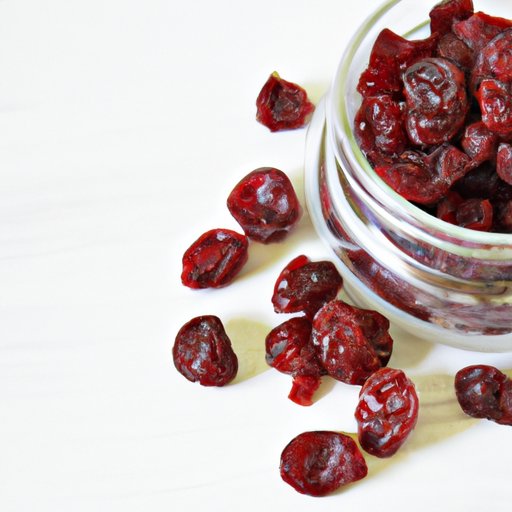Introduction
Dried cherries are a delicious and nutritious snack that can provide various health benefits. They are made by removing the moisture from fresh cherries, which preserves their flavor and nutrition. Although dried cherries are higher in calories than fresh cherries, they still offer many health benefits due to their high nutrient content.
In this article, we’ll explore the health benefits of eating dried cherries and provide a nutritionist’s guide to incorporating them into a healthy diet. We’ll also look at how much dried cherry you should eat for optimal health, along with the vitamin and mineral content of dried cherries, and finish up with some tasty recipes for every meal.

Exploring the Health Benefits of Dried Cherries
Dried cherries are a good source of antioxidants, which are compounds found naturally in plants that help protect cells from damage caused by free radicals. Studies have shown that consuming foods high in antioxidants may help reduce inflammation, lower your risk of chronic disease, and improve overall health.
Dried cherries also contain anthocyanins, which are a type of antioxidant that gives cherries their red color. Studies have found that anthocyanins have anti-inflammatory properties, which can help reduce symptoms of inflammatory conditions such as arthritis, asthma, and colitis.
In addition, there is some evidence that suggests that eating dried cherries may help prevent cancer. A study has found that compounds found in cherries, such as ellagic acid, may inhibit the growth of cancer cells.
A Nutritionist’s Guide to Eating Dried Cherries
When it comes to incorporating dried cherries into a healthy diet, it’s important to be mindful of portion sizes. The recommended serving size of dried cherries is 1/4 cup, or approximately 30 grams. This serving size provides approximately 100 calories and is a good source of fiber, vitamin C, and iron.
When choosing dried cherries, look for those that are unsweetened and unprocessed. It’s also important to read the ingredients label and avoid products with added sugars or preservatives. And if you’re looking for a healthier option, opt for organic dried cherries.
To get the most out of dried cherries, try to incorporate them into meals and snacks throughout the day. For breakfast, add a handful of dried cherries to oatmeal, yogurt, or smoothies. For lunch and dinner, toss dried cherries into salads or stir-fries. As a snack, enjoy a handful of dried cherries on their own or pair them with nuts or seeds for a healthy and satisfying treat.
How Much Dried Cherry Should You Eat for Optimal Health?
The amount of dried cherries you should eat depends on several factors, including your age, gender, and activity level. Generally speaking, the recommended daily intake of dried cherries is 1/4 cup, or approximately 30 grams. If you’re looking for additional health benefits, you could increase your intake to 1/2 cup per day.
It’s also important to consider the other sources of antioxidants and nutrients in your diet when deciding how much dried cherries to eat. Eating a variety of fruits, vegetables, and whole grains will help ensure you’re getting the necessary vitamins and minerals.

The Vitamin and Mineral Content of Dried Cherries
Dried cherries are an excellent source of vitamins and minerals, including vitamin A, vitamin C, calcium, magnesium, and potassium. Vitamin A helps support vision and immune system health, while vitamin C boosts collagen production and helps promote wound healing. Calcium and magnesium are essential for bone health, and potassium helps regulate blood pressure and fluid balance.
In addition, dried cherries are a good source of dietary fiber, which is important for digestion and heart health. Fiber helps keep you feeling full longer, which can aid in weight management.
Can Dried Cherries Help with Weight Loss?
Dried cherries are a low-calorie snack, but they are also high in fiber, which can help with weight loss. Studies have found that increasing fiber intake can lead to a decrease in calorie intake, which may help with weight loss. In addition, the fiber in dried cherries helps to keep you feeling full longer, which can reduce cravings and overeating.
Cooking with Dried Cherries: Healthy Recipes for Every Meal
Dried cherries are a versatile ingredient that can be added to a variety of recipes. For breakfast, try adding dried cherries to overnight oats or a smoothie bowl. For lunch, make a salad with dried cherries, feta cheese, and spinach. For dinner, add dried cherries to a stir-fry or a quinoa dish. Or for a sweet treat, make a batch of homemade cherry granola bars.
Conclusion
Dried cherries are a nutritious snack with numerous health benefits. They are high in antioxidants, which can help reduce inflammation and may prevent certain types of cancer. They’re also a good source of fiber, vitamins, and minerals, which can help support overall health. When eaten in moderation, dried cherries can be a great addition to a healthy diet.
When incorporating dried cherries into your diet, it’s important to be mindful of portion sizes and choose unsweetened and unprocessed varieties. Aim for 1/4 cup per day for general health benefits, or up to 1/2 cup if you’re looking for additional health benefits. Finally, don’t forget to experiment with different recipes to make the most of this delicious and nutritious snack.
(Note: Is this article not meeting your expectations? Do you have knowledge or insights to share? Unlock new opportunities and expand your reach by joining our authors team. Click Registration to join us and share your expertise with our readers.)
